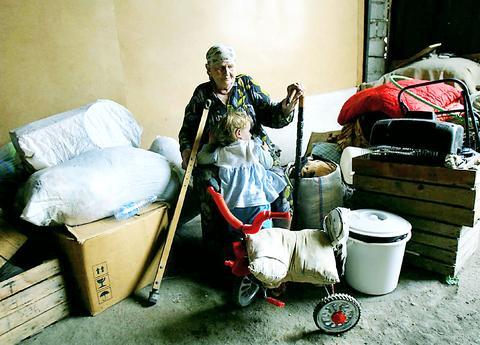A woman from Chechnya, an invalid, sat by a mound of dirty possessions, her three grandchildren wandering in the dust nearby. Their refugee camp was emptying, but they were too poor to buy a ride on the trucks hurriedly heading out of here.
"I have been packed and waiting for three days," said the woman, Manzha Yansuyeva, 78. "I am hoping someone will pity us and help us move."
Following raids by Islamic guerrillas the night of June 21 in the southern Russian republic of Ingushetia, Chechen refugees are in motion once more, saying they are being blamed for the guerrillas' success and must leave or face retaliation in the night. They are deeply afraid.

PHOTOS: NY TIMES NEWS SERVICE
The guerrillas overran police stations and checkpoints here early last week, and, dressed in police uniforms themselves, systematically executed law enforcement and military personnel who tried to come to their besieged friends' aid. Nearly 100 people died before the guerrillas withdrew.
In the days since, Russian and Ingush police, wearing ski masks and carrying assault rifles, have accused Chechen refugees of assisting and sheltering the guerrillas.
They have been rounding up Chechen men for questioning and, the refugees say, for beatings.
Thousands of Chechens are heeding what they regard as an implicit message, now fleeing Ingushetia for Grozny, Chechnya's capital.
"We haven't slept for days already," said Yakhita Dzhabrailova, 57.
Grozny hardly invites. Having suffered two wars in a decade, the city is in ruins, occupied by the Russian Army and controlled by grim-faced armed men whose affiliation is rarely clear.
Civilians frequently disappear, seized in what human rights organizations and local residents describe as a mix of kidnappings for ransoms and violence against residents accused of supporting, even knowing, the guerrillas.
A cornerstone of President Vladimir Putin's effort to convince the world that Chechnya has been stabilizing has rested on Chechen refugees returning home.
During the height of the second Chechen war, more than 100,000 Chechens sought refuge on Ingush soil; the Kremlin had hoped that coaxing them home would demonstrate security and hope. But tens of thousands of refugees had not complied with Moscow's wish, choosing a suspended state of poverty and grief in Ingushetia over lingering horrors in Chechnya.
It took the outbreak of violence in Ingushetia -- an expansion of terror, not a reduction -- to put them to motion.

A fire caused by a burst gas pipe yesterday spread to several homes and sent a fireball soaring into the sky outside Malaysia’s largest city, injuring more than 100 people. The towering inferno near a gas station in Putra Heights outside Kuala Lumpur was visible for kilometers and lasted for several hours. It happened during a public holiday as Muslims, who are the majority in Malaysia, celebrate the second day of Eid al-Fitr. National oil company Petronas said the fire started at one of its gas pipelines at 8:10am and the affected pipeline was later isolated. Disaster management officials said shutting the

US Vice President J.D. Vance on Friday accused Denmark of not having done enough to protect Greenland, when he visited the strategically placed and resource-rich Danish territory coveted by US President Donald Trump. Vance made his comment during a trip to the Pituffik Space Base in northwestern Greenland, a visit viewed by Copenhagen and Nuuk as a provocation. “Our message to Denmark is very simple: You have not done a good job by the people of Greenland,” Vance told a news conference. “You have under-invested in the people of Greenland, and you have under-invested in the security architecture of this

UNREST: The authorities in Turkey arrested 13 Turkish journalists in five days, deported a BBC correspondent and on Thursday arrested a reporter from Sweden Waving flags and chanting slogans, many hundreds of thousands of anti-government demonstrators on Saturday rallied in Istanbul, Turkey, in defence of democracy after the arrest of Istanbul Mayor Ekrem Imamoglu which sparked Turkey’s worst street unrest in more than a decade. Under a cloudless blue sky, vast crowds gathered in Maltepe on the Asian side of Turkey’s biggest city on the eve of the Eid al-Fitr celebration which started yesterday, marking the end of Ramadan. Ozgur Ozel, chairman of the main opposition Republican People’s Party (CHP), which organized the rally, said there were 2.2 million people in the crowd, but

JOINT EFFORTS: The three countries have been strengthening an alliance and pressing efforts to bolster deterrence against Beijing’s assertiveness in the South China Sea The US, Japan and the Philippines on Friday staged joint naval drills to boost crisis readiness off a disputed South China Sea shoal as a Chinese military ship kept watch from a distance. The Chinese frigate attempted to get closer to the waters, where the warships and aircraft from the three allied countries were undertaking maneuvers off the Scarborough Shoal — also known as Huangyan Island (黃岩島) and claimed by Taiwan and China — in an unsettling moment but it was warned by a Philippine frigate by radio and kept away. “There was a time when they attempted to maneuver